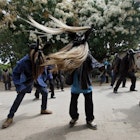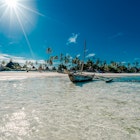
Nov 27, 2024 • 7 min read
Jun 25, 2018 • 6 min read

The impressive mountain range of Parque Nacional Serra dos Ă“rgĂŁos. Rafael Fernando / 500px
Summer temperatures in Rio regularly top 40°C (104°F), leading locals and tourists to crowd the nearby beaches and forest waterfalls to escape the heat. On weekends it can seem like the entire city is jostling for a spot next to the refreshing waters – to miss the crowds, drive up into the hills north of the city where the temperatures are cool and the scenery is even cooler.
This region, known as the Serrana, still shows the influence of the German settlers who came in droves during the 19th century, and it has plenty to interest visitors including the historic cities of PetrĂłpolis and TeresĂłpolis, along with a stunning national park.
Located 70km north of Rio de Janeiro, PetrĂłpolis is nestled among cool forested hills at an elevation of 838m (2,749 ft). Brazil was ruled as an empire between 1822 and 1889 and it was Emperor Dom Pedro II who both commissioned PetrĂłpolis and gave it its name (PetrĂłpolis is a conjunction of Petrus and Polis, Latin and Greek respectively for Pedro and city). Construction was started in 1845 and completed two years later. The city was designed by JĂşlio Frederico Koeler, a German engineer, and it was largely populated with German immigrants who were encouraged to settle there after its construction. The German influence can be seen to this day, from the architecture and street names to the restaurant menus.
A little more than 20km to the northeast of Petrópolis, across the spectacular Serra dos Órgãos National Park, lies its sister city, Teresópolis (named after Dom Pedro’s wife, Teresa Cristina). Teresópolis is far smaller than Petrópolis but enjoys a similar comfortable climate and an even more laid back vibe.
Although there are many attractions and activities in the region, many Brazilians who visit regularly will tell you that the best way to enjoy the Serrana is to simply relax with some good food in good company and enjoy the scenery. With countless guesthouses and short-term private rentals available, many in bucolic locations boasting stunning views, this is easily achievable. Buses run regularly between Rio’s main bus terminal and the towns and cities of the Serrana, though the best way to explore the area is to hire a car.

The Serra dos Órgãos National Park (also referred to by its Portuguese acronym, PARNASO) covers 105 sq km (40 sq miles) and lies between Petrópolis and Teresópolis. The park is swathed in verdant forests and dominated by dramatic pointed mountains, including the iconic Dedo de Deus (God’s Finger) and Agulha do Diabo (Devil’s Needle).
The park has over 200km of trails, ranging from the easy walks past waterfalls and pools, such as the 1.3km Trilha Suspenso (Suspended Trail), to the 3-day Travessia PetrĂłpolis-TeresĂłpolis (PetrĂłpolis-TeresĂłpolis Crossing), crossing the entire park from PetrĂłpolis to TeresĂłpolis. Experienced rock climbers can find major challenges such as the full day ascent of Dedo de Deus. Those not up to scaling the heights of this enormous finger-like peak should not miss the breath-taking view from Mirante do Soberbo on the outskirts of TeresĂłpolis.
The park is exceptionally well-organized, with excellent visitor centers; clearly marked, well-maintained trails; and entrance tickets that include official park accommodation for multi-day hikes. Entrance to the park is R$52 (US$14) and accommodation ranges from R$10 (US$2.50) for camping to R$39 (US$10) for a bunkbed in a dorm.

The Imperial Museum is the largest and most complete collection of relics and artifacts relating to Brazil’s imperial history. The museum is housed in the summer palace of Emperor Dom Pedro II, located in the very center of Petrópolis. Completed in 1862, the impressive neoclassical building is surrounded by tranquil gardens, lined with exotic plants and trees.
The museum itself, founded in 1940, houses more than 300,000 items including original furniture and paintings that belonged to the imperial family. Highlights include the imperial crown jewels and the golden quill that was used to sign the order abolishing slavery in 1888. All visitors are required to don protective slippers to avoid damaging the original floors – to the obvious delight of younger visitors, this leads many to skate and slide their way around the museum’s grand halls and corridors. Not all of the display information is translated into English, but there is a museum app which is available in English and Portuguese.
With such a strong German influence in the region, it’s hardly surprising that Petrópolis and Teresópolis are beer-making powerhouses – both cities have large breweries that offer tours.
In Petrópolis, a German settler started making beer on the site of today’s Bohemia Brewery in 1853. The brewery has an excellent beer museum complete with interactive exhibits and a wealth of information regarding the history of the Bohemia Brewery. The guided tours, with English-speaking guides, include ample opportunities to sample the different beers and finish up with the option to continue drinking in a bar and restaurant.
in TeresĂłpolis is the home of the highly regarded TherezĂłpolis range of beers. Although parts of this attraction look more like a German-style theme park, the actual brewery tour section is interesting and culminates with a tasting experience in which each style of beer is paired with a cheese. While not as slick as the Bohemia tour, there is still plenty here to keep beer-lovers interested. The tours are in Portuguese only, so bring someone who can translate or be prepared smile and nod.

The is held every year in Petrópolis to celebrate the German settlers who came to the region in the 19th century. Hundreds of thousands of visitors flock to the festival which runs for ten days at the end of June. Held in the impressive Crystal Palace, the festival features everything you might expect from a German festival – lederhosen-clad oompah bands, enormous mugs of beer, glühwein and vast numbers of sausages. At other times of year, visitors can get their fix of German staples (sausage, potato salad and strudel) at .
Started in 1973 by a group of local artisans, the (Feirarte) is a massive arts and crafts market in the center of TeresĂłpolis that has more than 600 stalls selling a wide variety of locally produced items and attracts around 5,000 people each weekend. The fair runs all day Saturday and Sunday from 10am-6pm.
Pousada Tankamana is set in the stunning, forested hills of Itaipava, 12km northwest of TeresĂłpolis. The sixteen private chalets, fitted with hot tubs perfect for chilly evenings, are spread across the spacious gardens. Locanda Della Mimosa offers grand hotel luxury and fine dining on the northern outskirts of PetrĂłpolis, while the mid-priced is located right on the edge of the Serra dos Ă“rgĂŁos Park and is a perfect jumping-off point for those wanting to explore the park.


Nov 27, 2024 • 7 min read







